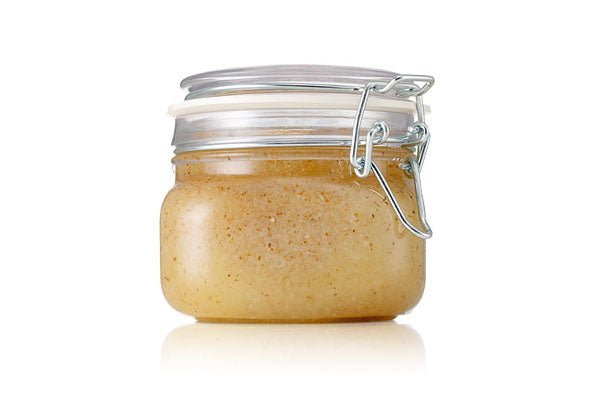Exfoliating Too Much Can Be Messing up That Clear, Gorgeous Complexion Of Yours

clear your pores, minimize breakouts and give you a clear, even visage. So come the next article, in which I'm quoted, say that this can also be the fastest way you could be screwing up that gorgeous mug of yours. Read on please. Source: Refinery29.com By Megan McIntyre The Surprising Way You're Screwing Up Your Skin  Exfoliation: A crucial step to maintaining a clear, glowing, gorgeous complexion or is it? While all of the doctors and aestheticians we've spoken to over the years agree that it's a necessary step to make your skin looks its best, they also told us that it's the number-one skin care product they see women abuse. "Women think that if they exfoliate more frequently, they will get rid of dead skin cells," says Dr. Marko Lens, a plastic and reconstructive surgeon and founder of the skin care line Zelens. "However, they don't know that this will not give the skin time to follow a natural renewal process the so-called natural turnover of epidermal cells which is crucial in skin regeneration." And, depending on your skin type, that can lead to anything from more breakouts to thin skin, dryness, and premature aging. Yikes. According to celebrity aestheticians Mila Moursi and Joanna Vargas, the first thing that alerts them that their clients are overdoing it with the exfoliation is a red visage speckled with dry patches. "Overexfoliating strips the skin of natural oils, thereby irritating and inflaming the skin," says Moursi. "Overstripped skin can backfire and then cause excess oil production, triggering breakouts," she warns. The big question, then, is how much is too much? The answers vary, depending on your skin type, but our experts generally agreed that 2-3 times per week is plenty. And that goes for physical exfoliators like scrubs and chemical exfoliators like alpha-hydroxy acids, retinols, and glycolic acid. In terms of which type of exfoliator to use chemical or physical Moursi, Vargas, and Dr. Lens all agree that it's better to combine the two for best results. "A physical exfoliator will soften the dead skin cells really well and bring the life back to your skin," says Vargas, "while a chemical one will break down that first layer of skin and resurface." She loves the ingredient galactoarabinan because it also acts as an anti-inflammatory, while Moursi suggests tried-and-true AHAs, glycolic acid, and lactic acid. Dr. Lens likes the enzyme papain, and lactobionic acid because it has strong hydrating properties and won't irritate already-sensitive skin. If you are guilty of OD'ing on the scrubs and peels, Dr. Lens advises you to cut the exfoliation down to once a week max and avoid cleansers with heavy detergents and mineral oils, which can further irritate the skin. For immediate relief, Moursi recommends a cold milk compress once a day for three days, followed by a super-nourishing oil or balm. Vargas suggests a soothing yogurt mask, and then seeking out a milder exfoliator once your skin heals. For more Joanna Vargas press click here.]>>
Exfoliation: A crucial step to maintaining a clear, glowing, gorgeous complexion or is it? While all of the doctors and aestheticians we've spoken to over the years agree that it's a necessary step to make your skin looks its best, they also told us that it's the number-one skin care product they see women abuse. "Women think that if they exfoliate more frequently, they will get rid of dead skin cells," says Dr. Marko Lens, a plastic and reconstructive surgeon and founder of the skin care line Zelens. "However, they don't know that this will not give the skin time to follow a natural renewal process the so-called natural turnover of epidermal cells which is crucial in skin regeneration." And, depending on your skin type, that can lead to anything from more breakouts to thin skin, dryness, and premature aging. Yikes. According to celebrity aestheticians Mila Moursi and Joanna Vargas, the first thing that alerts them that their clients are overdoing it with the exfoliation is a red visage speckled with dry patches. "Overexfoliating strips the skin of natural oils, thereby irritating and inflaming the skin," says Moursi. "Overstripped skin can backfire and then cause excess oil production, triggering breakouts," she warns. The big question, then, is how much is too much? The answers vary, depending on your skin type, but our experts generally agreed that 2-3 times per week is plenty. And that goes for physical exfoliators like scrubs and chemical exfoliators like alpha-hydroxy acids, retinols, and glycolic acid. In terms of which type of exfoliator to use chemical or physical Moursi, Vargas, and Dr. Lens all agree that it's better to combine the two for best results. "A physical exfoliator will soften the dead skin cells really well and bring the life back to your skin," says Vargas, "while a chemical one will break down that first layer of skin and resurface." She loves the ingredient galactoarabinan because it also acts as an anti-inflammatory, while Moursi suggests tried-and-true AHAs, glycolic acid, and lactic acid. Dr. Lens likes the enzyme papain, and lactobionic acid because it has strong hydrating properties and won't irritate already-sensitive skin. If you are guilty of OD'ing on the scrubs and peels, Dr. Lens advises you to cut the exfoliation down to once a week max and avoid cleansers with heavy detergents and mineral oils, which can further irritate the skin. For immediate relief, Moursi recommends a cold milk compress once a day for three days, followed by a super-nourishing oil or balm. Vargas suggests a soothing yogurt mask, and then seeking out a milder exfoliator once your skin heals. For more Joanna Vargas press click here.]>>
 Exfoliation: A crucial step to maintaining a clear, glowing, gorgeous complexion or is it? While all of the doctors and aestheticians we've spoken to over the years agree that it's a necessary step to make your skin looks its best, they also told us that it's the number-one skin care product they see women abuse. "Women think that if they exfoliate more frequently, they will get rid of dead skin cells," says Dr. Marko Lens, a plastic and reconstructive surgeon and founder of the skin care line Zelens. "However, they don't know that this will not give the skin time to follow a natural renewal process the so-called natural turnover of epidermal cells which is crucial in skin regeneration." And, depending on your skin type, that can lead to anything from more breakouts to thin skin, dryness, and premature aging. Yikes. According to celebrity aestheticians Mila Moursi and Joanna Vargas, the first thing that alerts them that their clients are overdoing it with the exfoliation is a red visage speckled with dry patches. "Overexfoliating strips the skin of natural oils, thereby irritating and inflaming the skin," says Moursi. "Overstripped skin can backfire and then cause excess oil production, triggering breakouts," she warns. The big question, then, is how much is too much? The answers vary, depending on your skin type, but our experts generally agreed that 2-3 times per week is plenty. And that goes for physical exfoliators like scrubs and chemical exfoliators like alpha-hydroxy acids, retinols, and glycolic acid. In terms of which type of exfoliator to use chemical or physical Moursi, Vargas, and Dr. Lens all agree that it's better to combine the two for best results. "A physical exfoliator will soften the dead skin cells really well and bring the life back to your skin," says Vargas, "while a chemical one will break down that first layer of skin and resurface." She loves the ingredient galactoarabinan because it also acts as an anti-inflammatory, while Moursi suggests tried-and-true AHAs, glycolic acid, and lactic acid. Dr. Lens likes the enzyme papain, and lactobionic acid because it has strong hydrating properties and won't irritate already-sensitive skin. If you are guilty of OD'ing on the scrubs and peels, Dr. Lens advises you to cut the exfoliation down to once a week max and avoid cleansers with heavy detergents and mineral oils, which can further irritate the skin. For immediate relief, Moursi recommends a cold milk compress once a day for three days, followed by a super-nourishing oil or balm. Vargas suggests a soothing yogurt mask, and then seeking out a milder exfoliator once your skin heals. For more Joanna Vargas press click here.]>>
Exfoliation: A crucial step to maintaining a clear, glowing, gorgeous complexion or is it? While all of the doctors and aestheticians we've spoken to over the years agree that it's a necessary step to make your skin looks its best, they also told us that it's the number-one skin care product they see women abuse. "Women think that if they exfoliate more frequently, they will get rid of dead skin cells," says Dr. Marko Lens, a plastic and reconstructive surgeon and founder of the skin care line Zelens. "However, they don't know that this will not give the skin time to follow a natural renewal process the so-called natural turnover of epidermal cells which is crucial in skin regeneration." And, depending on your skin type, that can lead to anything from more breakouts to thin skin, dryness, and premature aging. Yikes. According to celebrity aestheticians Mila Moursi and Joanna Vargas, the first thing that alerts them that their clients are overdoing it with the exfoliation is a red visage speckled with dry patches. "Overexfoliating strips the skin of natural oils, thereby irritating and inflaming the skin," says Moursi. "Overstripped skin can backfire and then cause excess oil production, triggering breakouts," she warns. The big question, then, is how much is too much? The answers vary, depending on your skin type, but our experts generally agreed that 2-3 times per week is plenty. And that goes for physical exfoliators like scrubs and chemical exfoliators like alpha-hydroxy acids, retinols, and glycolic acid. In terms of which type of exfoliator to use chemical or physical Moursi, Vargas, and Dr. Lens all agree that it's better to combine the two for best results. "A physical exfoliator will soften the dead skin cells really well and bring the life back to your skin," says Vargas, "while a chemical one will break down that first layer of skin and resurface." She loves the ingredient galactoarabinan because it also acts as an anti-inflammatory, while Moursi suggests tried-and-true AHAs, glycolic acid, and lactic acid. Dr. Lens likes the enzyme papain, and lactobionic acid because it has strong hydrating properties and won't irritate already-sensitive skin. If you are guilty of OD'ing on the scrubs and peels, Dr. Lens advises you to cut the exfoliation down to once a week max and avoid cleansers with heavy detergents and mineral oils, which can further irritate the skin. For immediate relief, Moursi recommends a cold milk compress once a day for three days, followed by a super-nourishing oil or balm. Vargas suggests a soothing yogurt mask, and then seeking out a milder exfoliator once your skin heals. For more Joanna Vargas press click here.]>>






